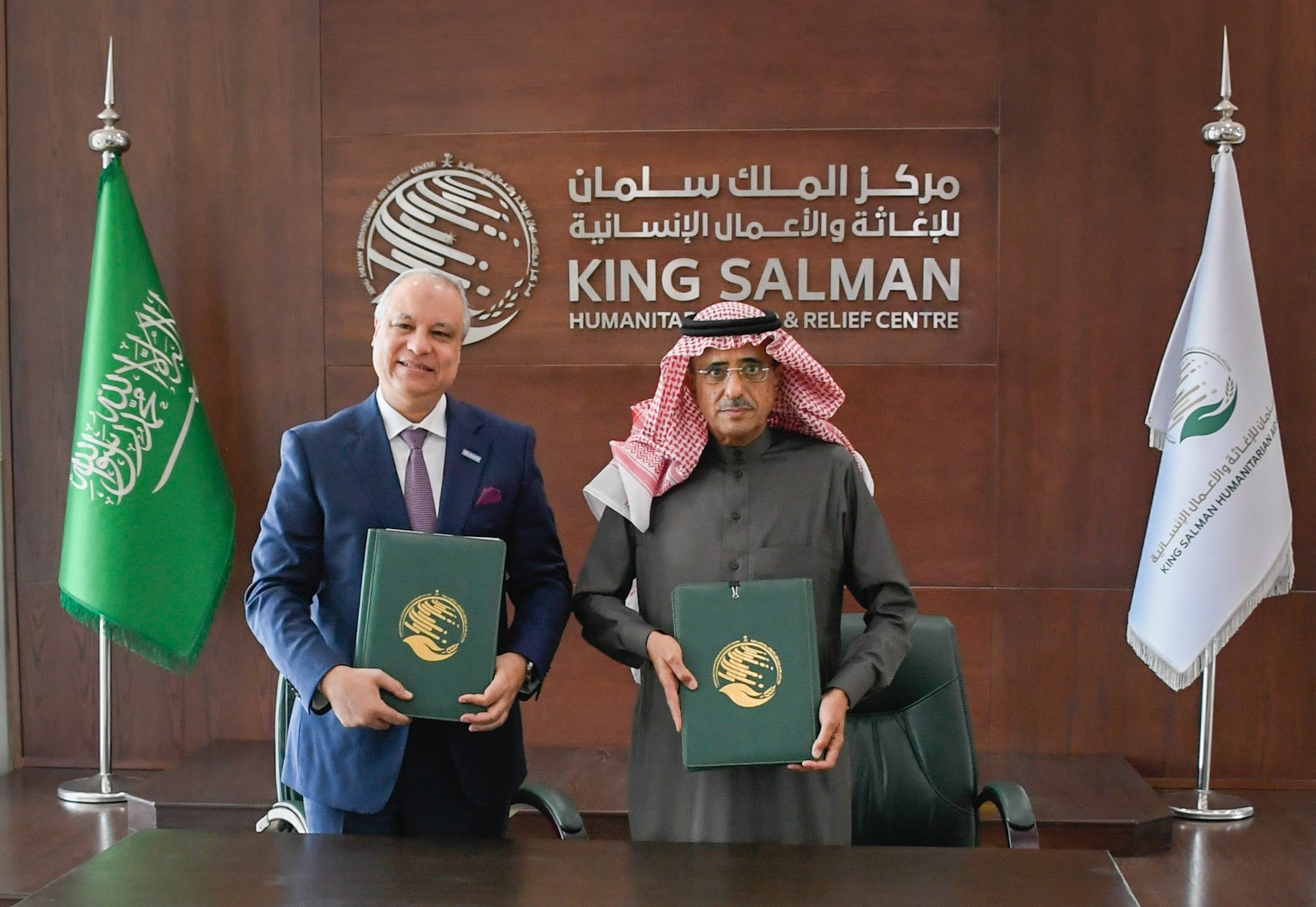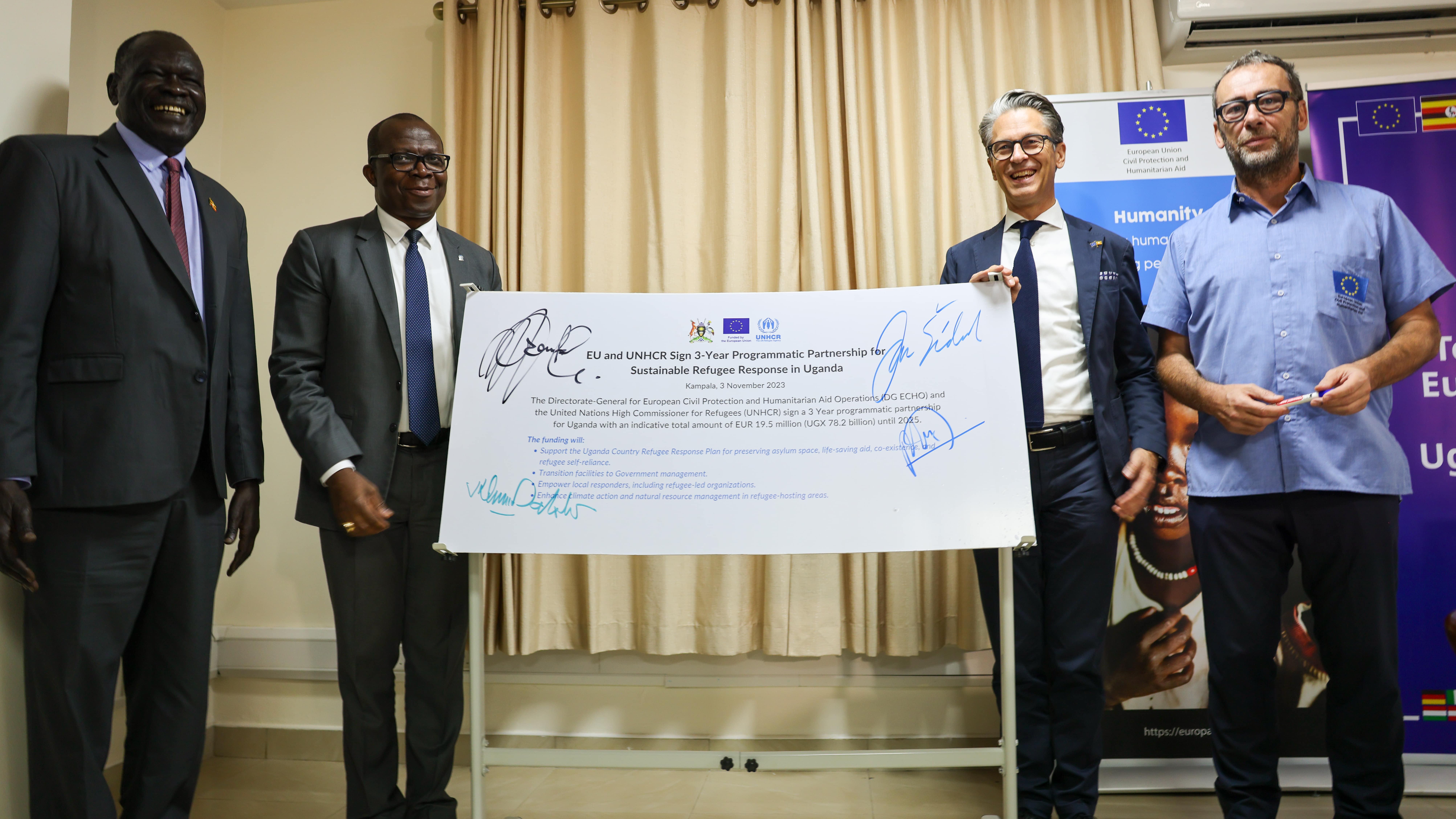UNHCR's Grandi calls for renewed high-level engagement to advance Uganda's comprehensive refugee response
UNHCR's Grandi calls for renewed high-level engagement to advance Uganda's comprehensive refugee response

UN High Commissioner for Refugees Filippo Grandi concluded today a visit to Yumbe district, reaffirming the utmost commitment of UNHCR, the UN Refugee Agency, to supporting a comprehensive refugee response in Uganda.
A high-level government delegation led by Minister of State for Local Government Jennifer Namuyangu joined the field trip to Yumbe town and Bidibidi settlement, 250 square kilometres of low and rolling hills home to over 235,000 refugees from South Sudan.
During a four-hour tour of Africa’s largest refugee settlement and surrounding areas, the dignitaries paid a visit to projects benefitting refugees and the host community and supported by humanitarian and development partners working side by side, with the ultimate goal of ensuring full government ownership and management – which requires a more predictable and equitable international responsibility-sharing for refugees, in the spirit the Global Compact on Refugees (GCR).
“What I witnessed in Yumbe is extraordinary,” said Grandi adding that Uganda has shown strong leadership in moving the GCR forward. “This settlement realizes the vision for shared responsibility and a comprehensive response to refugee crises and gives me fresh confidence that the Global Compact on Refugees can be successfully operationalized worldwide.”
Zone 3 hosts the largest solar powered water system across the entire refugee response, serving more than 18,000 refugees and Ugandans. Completed in 2019 with funding from the European Civil Protection and Humanitarian Aid Operations (ECHO), the German Development Bank (KfW) and the United Kingdom, the system will be soon handed over to the Northern Umbrella Authority for Water and Sanitation, under the Ministry of Water and Environment, following capacity-building by the German International Cooperation (GIZ) and the World Bank.
At the Twajiji Primary School, the delegation surveyed the new classrooms and teachers’ accommodation built with contributions from KfW. UNHCR helps with the daily running of the school, paying the teachers’ salaries.
In the district’s main town is Yumbe Primary School. This facility was constructed in 2019 under the Development Response to Displacement Impacts Project (DRDIP), a government’s flagship initiative, supported by the international community through the World Bank, to improve access to basic social services in areas that host refugees. The presence of refugees is the key criterion to invest DRDIP resources for local development.
“Uganda is proud to lead a positive narrative on refugees and to demonstrate not only our humanity, but that together refugees and host communities can thrive,” said Minister Namuyangu adding that the economic and social benefits for the host communities are undeniable. However, continued the Minister, “a more cohesive and sustained international response is needed to ease pressure on local communities and to strengthen further the capacity of local service delivery as the refugee population continues to grow.”
Driving through Bidibidi and Yumbe town, Grandi sighted hundreds of electric poles and cables, evidence of a project already underway to connect the settlement to the national grid. Funded by Norway and implemented by Uganda’s Rural Electrification Agency, this initiative is part of a broader collaboration between the Norwegian Agency for Development Cooperation, GIZ and the World Bank to extend the national grid to refugee-hosting areas. When the Bidibidi electric grid goes live, UNHCR is planning to support last mile connection for schools, health centres and markets.
“This could be a game changer for the further development of the settlement and its surroundings,” said the High Commissioner noting that “in a matter of four years, we are seeing vast improvements to remote rural areas that host refugees.”
At a women’s centre, Grandi met with 39-year-old Margaret Kuyunge, a refugee from South Sudan who represents her community at the national Refugee Engagement Forum – a platform established in 2018 to ensure the views and concerns of refugees inform strategic discussions and decision-making.
“In my new role, I feel the voice of my community can be heard where it really matters. We are not just people with needs…we have provided our skills, dreams and contributions to our communities.”
Before heading to Kampala, the delegation appreciated the Apo Health Centre III, a government run facility which UNHCR equipped with five isolation units in 2020 to strengthen COVID-19 infection prevention and control measures, in partnership with ECHO.
In addressing the media in Bidibidi, Grandi’s message was univocal, urging all stakeholders “to remain engaged at the highest level to ensure the success of the Uganda comprehensive refugee response.” According to Grandi, “collective efforts are needed to address the humanitarian-development nexus and accelerate the transition to sustainable local government services.” The Uganda refugee model, continued Grandi, “remains a refugee model of global importance.”
In the East African country from 8-11 March, the High Commissioner will meet with President Yoweri Museveni, the First Deputy Prime Minister, Moses Ali, members of the diplomatic corps, the World Bank, UN agencies, non-governmental organizations and the Comprehensive Refugee Response Framework Steering Group – the main decision-making body for the implementation of the GCR in Uganda.
Uganda hosts more than 1.45 million refugees, with the vast majority living in rural settlements. Since the launch of the CRRF in 2017, the government has included refugees in the national development plans and endorsed sector plans to improve delivery of social services in refugee-hosting districts, namely Education, Health, Water and Environment, and Jobs and Livelihoods. Uganda is the only refugee hosting county that has developed comprehensive plans in these sectors, calling for contribution from the international community.
For more information, please contact:
In Kampala: Rocco Nuri, [email protected], +256 775 827 388
In Nairobi: Dana Hughes, [email protected], +254 733 440536









